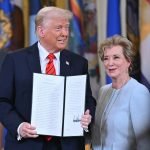
The High Price of Political Deception: How Dishonesty Harms United States
Posted in :
Political lies erode democracy, incite violence, harm public health, and polarize society—often funded by billionaire-backed media machines.
Eroding Trust in Democracy
Political misinformation is wreaking havoc on Americans’ trust in democracy. Repeated lies – particularly about our elections – have caused a lot of folks to question the system. Surveys show that 64% of Americans believe our democracy is “in crisis and at risk of failing,” and more than half say political divisions are only getting worse. A major reason is the “explosion of misinformation deliberately aimed at disrupting the democratic process,” which confuses voters and undermines trust in election outcomes. For example, the persistent “Big Lie” – the false claim that the 2020 presidential election was stolen – has had a lasting impact. As of 2022, 57% of white Americans and significant minorities of other groups believed there was fraud in the 2020 election. Only 20% of Americans now feel “very confident” in our election system’s integrity, while 56% have little or no confidence that elections represent the people’s will.
This erosion of trust is deeply destructive. In a recent report, 75% of Americans said disinformation undermines the election process, and 74% see it as a direct threat to our democracy. When citizens question the fundamental legitimacy of elections, they may turn away or even reject outcomes, undermining the peaceful transfer of power that democracy relies on. Election officials themselves have felt the danger: 64% of local election officials in 2022 said the spread of false information made their jobs more dangerous. Several of these public servants have been harassed and threatened by believers in viral lies about “fraud” or “rigged” voting. Misinformation has even been weaponized to justify new restrictive voting laws, with some politicians citing debunked claims of fraud as a reason to make voting harder. In short, when politicians freely spread lies, the public’s trust in government collapses – and without an informed, trusting public, our democracy cannot function effectively.
Inciting Real-World Violence
Misinformation doesn’t only corrode trust – it can also incite real-world anger and violence. We witnessed this on January 6, 2021, when a mob attacked the U.S. Capitol following months of disinformation that the election was rigged. More than 1,000 individuals have been charged in the Capitol riot — a stunning display of how perilous political misinformation can become. And yes, many participants actually believed the lies. For instance, one West Virginia man, a former local official, became radicalized by conspiracy theories on social media and joined the Capitol attack – and even after serving jail time, he still believes the 2020 election was illegitimate. This demonstrates how deeply misinformation can take hold, to the point of driving citizens to commit violence in “defense” of false narratives.

Rioters scaling a wall at the U.S. Capitol on January 6, 2021 – a stark example of how political misinformation and lies can spur ordinary people into violent action.
Tragically, the Capitol attack isn’t the only example. Around the country, dangerous conspiracy theories and false rhetoric have fueled vigilante violence. A notorious example was the 2016 “Pizzagate” incident, where a man fired a rifle inside a Washington pizzeria due to an entirely baseless online conspiracy about politicians running a child-trafficking ring. In recent years, QAnon followers (who believe a hidden cabal is controlling government) have been arrested for violent schemes — ranging from kidnappings to even murder — fueled by fantasy stories propagated by powerful voices.
Even more recently, an attack on the Centers for Disease Control and Prevention (CDC) headquarters in Atlanta highlighted the link between misinformation and violence. In August 2025, a Georgia man opened fire on the CDC campus, firing over 180 shots and killing a police officer. He reportedly blamed the COVID-19 vaccine for his mental health troubles and targeted the CDC due to bizarre falsehoods he believed. Investigators found written notes expressing his anger about the vaccines. This tragic incident prompted public health officials to speak out: years of false rhetoric about vaccines and public health “was bound to take a toll on people’s mental health” and “leads to violence,” one CDC veteran said. That is, when politicians or pundits push incendiary lies – say, vaccines are
dangerous, or health agencies are evil – people eventually behave on those lies. As one extremism researcher told me, “Political leadership in a democracy matters… if [their] rhetoric dehumanizes or vilifies others, it can open the door for people pulling towards violence.”
Importantly, this trend is escalating threats to public officials and institutions. Election officials, judges, school board members, and health workers have all seen upticks in threats against them. In the CDC shooting’s wake, former U.S. Surgeon General Dr. Jerome Adams warned that these “ever-escalating threats [to] public health workers” are “shaped by misinformation, politicization, and inflammatory rhetoric.”. Lies and conspiracy theories aren’t benign – they threaten real lives. American society is now painfully learning that lying in politics is never a victimless crime. As fact-checker Bill Adair notes, when politicians choose to lie, “there are often people who suffer”, sometimes even lives lost or reputations ruined.
Public health and safety are also at risk.
One of the most damaging impacts of political lies has been on public health. In the COVID-19 era, lies and disinformation about the virus and vaccines proliferated nearly as quickly as the virus. Others, including elected officials and media personalities, minimized the illness, promoted unproven ‘cures,’ or said that vaccines were unsafe – all in direct conflict with medical experts. The result was that millions of Americans delayed or refused vaccination, often due to false beliefs. This had deadly consequences. A careful analysis by the Kaiser Family Foundation found that at least 234,000 COVID-19 deaths in the United States could have been prevented with vaccines between June 2021 and March 2022. In other words, nearly a quarter of a million Americans died in less than one year needlessly – largely because they were unvaccinated in an era when vaccines were available to all adults. That was post-vaccine availability, so a majority of those victims probably succumbed to vaccine hesitancy and misinformation about the jabs. Health experts lament that “those individuals remain at dramatically increased risk” by rejecting vaccines, emphasizing that misinformation literally cost lives.

The U.S. CDC headquarters in Atlanta. Public health agencies like the CDC have been targeted by conspiracy-fueled anger during the pandemic, showing how misinformation can endanger even those working to keep us safe.
Misinformation also fostered hostility toward health professionals. Across the country, local public health officers faced harassment, threats, and intimidation for promoting masks and vaccines. No doubt many were tared with the tyrant brush on conspiracy theories. By mid-2021, dozens of public health officials had resigned or been driven from their posts on account of political blowback and personal threats. The aforementioned CDC shooting is a horrifying extreme of this menace. The shooter’s actions were directly tied to vaccine disinformation – a fact so concerning that the CDC’s employee union urged leaders to explicitly condemn the falsehoods that “pose a dangerous threat to public health and safety.” The American Public Health Association likewise warned that the attack “highlight(s) the inherent danger and human cost of disinformation surrounding life-saving vaccines”.
Beyond COVID-19, political health lies are still killing Americans. Misinformation surrounding standard childhood vaccines has led to the return of diseases such as measles that were nearly eradicated. False rumors about drugs and cures cause some patients to avoid beneficial treatments. Overall, health misinformation – often originating from or amplified by political figures – has eroded public confidence in scientific guidance right when it’s most needed. As one dean of public health noted, because health is so personal, it’s an area where “misinformation can really take hold”, especially when people are in ideological echo chambers. And the cruel irony is that they’re often the victims of these lies who end up paying with their health, or their life.
Billionaire-Funded Lies and Mass Marketing
Why does political disinformation travel so wide, so fast? One major reason is the massive money and media machinery behind it. In today’s America, billionaires and mega-donors pour enormous sums of money into political campaigns and propaganda outlets, effectively paying to amplify certain narratives – even false ones. Our election campaigns have become multi-billion-dollar marketing battles, and unfortunately lying often “works” as a strategy to energize a political base. Politicians willing to lie have super-wealthy backers who will finance advertising and media coverage to blast those lies to millions. As PolitiFact founder Bill Adair puts it, politicians make a cynical calculation: “am I going to gain more from making this false statement than I lose?. Too often, they choose to say yes – particularly if deep-pocketed donors are ready to fund the cause.
Consider campaign finance: The 2022 U.S. elections were the most expensive midterms in history, with over $16.7 billion spent on state and federal races. A lot of this came from a miniscule group of mega wealthy donors. In fact, just 21 billionaire donor families contributed $783 million in 2022 – more than the combined donations of 3.7 million small donors. Billionaires accounted for 15% of all federal election funding that year. This imbalance means a few wealthy individuals can drown out ordinary voices and shape the narratives voters hear. All too frequently, smart funders pour money into super PACS and partisan media that generate attack ads or hot takes. Dark money groups (which hide their donors) also funnel cash into disinformation campaigns on issues like climate change or gun rights, manufacturing doubt about scientific consensus or stoking fear with misleading claims.
Not only do billionaires finance political ads, but some own major media platforms that can promote their preferred messages. A prime example is Fox News, controlled by media mogul Rupert Murdoch. Fox provided a megaphone to election conspiracies after 2020, amplifying disinformation about voting machines being rigged. Internal communications later revealed that some Fox hosts and executives knew these claims were false, yet continued broadcasting them. Why? To ensure ratings and political capital. This had consequences: Fox News ultimately admitted to spreading lies about election fraud that caused “enormous damage”, and in 2023 the company paid a $787.5 million legal settlement for defaming a voting machine company with bogus allegations. It’s a shocking number, but remember how Fox’s lies stoked public rage and skepticism about democracy itself. From a business standpoint, disseminating those falsehoods kept a particular audience glued – and that equaled profit and influence. In essence, big lies can be highly lucrative for those who propagate them, at least until they are held accountable.
And social media (a lot of it managed by very rich tech bros) helps to supercharge misinformation. Their algorithms prioritize what gets clicked and shared – & sadly, outrun the nuanced truth. This means a false tweet from a politician or a conspiracy theory on Facebook can go viral to millions of people in hours, with little regard for fact. The outcome is a news ecosystem in which cash and clickbait incentivize lying. As misinformation researcher Caroline Jack observed, we are living in a “disinformation society” where made-up narratives can out-compete reality if they are backed by enough money and repetition. The fact that 61% of Americans see misinformation as a greater threat to society than even terrorism or climate change shows how aware the public has become of this problem. People can feel that rich interests distorting the truth is deforming our culture.
Polarization, Fear, and Division
When political lies saturate the airwaves and social media, one predictable outcome is social division. Misinformation increases polarization – driving Americans into opposing camps with entirely different versions of reality. In the short term, this “us vs. them” mentality can be politically useful to motivate supporters. But in the long run, it rips apart the social fabric of the nation. 73% of Americans say disinformation increases the polarization of political parties. And each side comes to hate and fear the other on the basis of stereotypes and lies. We’ve witnessed relatives cease conversations over conspiracy convictions, communities fracture over local misinformation-fueled scandals, and neighbor-on-neighbor violence over politically tinged hearsay.
Virulent speech demonizing the other side as evil or existential threat (hallmark of propaganda) can cause certain individuals to rationalize violence. Studies have found that toxic political polarization correlates with a higher likelihood of political violence. In other words, when folks are taught to dehumanize those who disagree – eg, labeling them traitors, pedophiles or terrorists without proof – it reduces the threshold for violence. For instance, leading up to the Capitol riot, most rioters really believed Democrats were destroying America (or worse) from radical disinformation. Psychologically, misinformation tends to exploit fear — fear of ‘the other,’ fear of government conspiracies, fear of vaccines, and so forth. Existential dread and righteous indignation are exhausting and debilitating, but the partisan disinformation farms keep you there because it breeds loyalty. As a CDC retiree noted after the Atlanta shooting, years of false and scary rhetoric inevitably “take a toll on people’s mental health.”
Another consequence is paralysis in solving real problems. When fundamental facts are disputed, it becomes impossible for society to unite around any course of action. For instance, climate change was delayed as a policy priority for years in part because industry-funded misinformation convinced a segment of the public (and politicians) that climate science was a “hoax.” Likewise, during the pandemic, mask-wearing and vaccination became politicized to the extent that even effective health measures were dismissed by hordes, extending our ordeal. Misinformation thus doesn’t just divide us – it can also cause us to waste precious time fighting fake problems or denying real ones, instead of uniting to tackle shared challenges.
Finally, pervasive political lying breeds cynicism and apathy among the public. Most people just feel like they can’t trust, or that all politicians lie and they tune out altogether. Turnout can take a hit when citizens toss up their hands and walk away in disgust. In a Howard University survey, 26% of respondents said they believe “my vote doesn’t count”, a disheartening sentiment often tied to hearing that “everything is rigged”. This is how democracy rots: not only with boisterous violence, but also soft desperation. When lies make it unfeasible to know what’s true, people give up and sit on sidelines, making the space all the more open for extremists and demagogues.
Conclusion: The immediacy of verity
All of these examples paint a clear picture: when politicians feel free to lie without consequence, American society pays the price. The damage from political misinformation is far-reaching – people have died, public servants have been terrorized, democracy has been weakened, and our nation has grown more divided and distrustful. Crucially, this problem is often supercharged by money. Billionaires and interest groups spend billions of dollars on marketing and propaganda to cement false narratives in people’s minds, because they often profit from the chaos and loyalty those narratives create.It’s a vicious cycle that we desperately must disrupt.
Here’s the good news: More Americans are recognizing the threat. A strong majority now view misinformation as one of the greatest dangers facing our country. We can funnel that consciousness toward action. Education and critical thinking are key: by teaching ourselves and our kids how to tell fact from fiction, we weaken the power of lies. Holding leaders accountable is also vital – politicians and media outlets that deliberately spread falsehoods must face public condemnation, fact-checking, and even legal consequences where appropriate (as we saw with the Fox News settlement). Moreover, supporting quality journalism and local news can help, since trustworthy reporting provides an antidote to rumor mills. And as citizens, we can require more robust transparency in campaign finance and social media algorithms, so that our information ecosystem isn’t simply auctioned to the highest bidder.
Democracy, at its very foundation, requires a shared reality and a minimum truth. As one public relations study noted, disinformation undermines elections and democracy itself. We’ve witnessed how readily lies go viral and how difficult it is to fix things. But we’ve also witnessed courageous scientists and journalists and ordinary people push back for facts. Rebuilding trust will take time, yet it begins with a simple commitment we all can make: value the truth. And politicians have to learn that lying has consequences, and the public must demand honesty as a baseline. Only then can we halt the hemorrhaging of faith and togetherness in this nation. America has overcome great challenges before – if we confront the epidemic of political lies with the seriousness it deserves, we can preserve a healthier democracy for generations to come.
Sources: The claims and statistics in this article are documented with credible sources, including the Associated Press, Reuters, the Brookings Institution, Kaiser Family Foundation, Harvard University research, and official surveys. I’ve included these citations inline (in the brackets) for readers to check and pursue.
PoliticalLies, Misinformation, Disinformation, USPolitics, DemocracyCrisis, PublicHealthRisk, BillionaireInfluence, ElectionFraudClaims, PoliticalViolence, MediaManipulation
PoliticalLies,#Misinformation,#Disinformation,#USPolitics,#Democracy,#PublicHealth,#BillionaireInfluence,#ElectionFraud,#Polarization,#MediaManipulation

